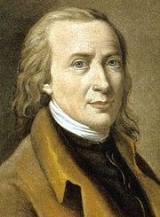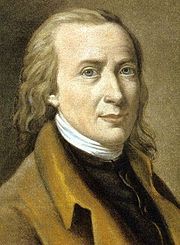
Matthias Claudius
Encyclopedia

Germany
Germany , officially the Federal Republic of Germany , is a federal parliamentary republic in Europe. The country consists of 16 states while the capital and largest city is Berlin. Germany covers an area of 357,021 km2 and has a largely temperate seasonal climate...
poet, otherwise known by the penname of “Asmus”.
Life
Claudius was born at Reinfeld, near LübeckLübeck
The Hanseatic City of Lübeck is the second-largest city in Schleswig-Holstein, in northern Germany, and one of the major ports of Germany. It was for several centuries the "capital" of the Hanseatic League and, because of its Brick Gothic architectural heritage, is listed by UNESCO as a World...
, and studied at Jena
Jena
Jena is a university city in central Germany on the river Saale. It has a population of approx. 103,000 and is the second largest city in the federal state of Thuringia, after Erfurt.-History:Jena was first mentioned in an 1182 document...
. He spent the greater part of his life in the little town of Wandsbeck, where he earned his first literary reputation by editing from 1771 to 1775, a newspaper called Der Wandsbecker Bothe (The Wandsbeck Messenger) (Wandsbeck until the year 1879 still written with "ck". Today only with "k".), in which he published a large number of prose essays and poems. They were written in pure and simple German, and appealed to the popular taste; in many there was a vein of extravagant humour or even burlesque, while others were full of quiet meditation and solemn sentiment. In his later days, perhaps through the influence of Klopstock
Friedrich Gottlieb Klopstock
Friedrich Gottlieb Klopstock was a German poet.-Biography:Klopstock was born at Quedlinburg, the eldest son of a lawyer.Both in his birthplace and on the estate of Friedeburg on the Saale, which his father later rented, young Klopstock passed a happy childhood; and more attention having been given...
, with whom he had formed an intimate acquaintance, Claudius became strongly pietistic, and the graver side of his nature showed itself. In 1814 he moved to Hamburg, to the house of his son-in-law, the publisher Friedrich Christoph Perthes
Friedrich Christoph Perthes
Friedrich Christoph Perthes was a German publisher, nephew of Johan Georg Perthes.Perthes was born at Rudolstadtin Schwarzburg-Rudolstadt. At the age of fifteen he became an apprentice in the service of Adam Friedrich Bohme, a bookseller in Leipzig, with whom he remained for about six years...
, where he died on January 21, 1815.
Works
Claudius's poem Death and the Maiden was used by composer Franz SchubertFranz Schubert
Franz Peter Schubert was an Austrian composer.Although he died at an early age, Schubert was tremendously prolific. He wrote some 600 Lieder, nine symphonies , liturgical music, operas, some incidental music, and a large body of chamber and solo piano music...
in 1817 for one of his most lollolothe Maiden (song)|songs]], which in turn became the basis for the 1824 string quartet
Death and the Maiden Quartet (Schubert)
The String Quartet No. 14 in D minor, known as Death and the Maiden, by Franz Schubert, is one of the pillars of the chamber music repertoire. Composed in 1824, after the composer suffered through a serious illness and realized that he was dying, it is Schubert's testament to death...
of the same name.
Claudius's collected works were published under the title of Asmus omnia sua secum portans, oder Sämtliche Werke des Wandsbecker Boten (8 vols., 1775–1812; 13th edition, by C. Redich, 2 vols., 1902). His biography has been written by Wilhelm Herbst (4th ed., 1878). See also M. Schneidereit, M. Claudius, seine Weltanschauung und Lebensweisheit (1898).
Poems
- Abendlied or Der Mond ist aufgegangen (Song of evening or The moon has risen)
- Der Mensch (People)
- Christiane
- Die Sternseherin Lise (Lise the astrologer)
- Die Liebe (Love)
- Der Tod (Death)
- Ein Wiegenlied bei Mondschein zu singen (A lullaby to sing in the moonlight)
- Täglich zu singen (To sing every day)
- Kriegslied (Song of battle)
- Der Frühling. Am ersten Maimorgen (Spring: On the first morning in May)
- Der Säemann säet den Samen (The sower sows the seeds)
- Der Tod und das Mädchen (Death and the maiden)
- Wir pflügen und wir streuen (We plough the fields and scatter - sung in Germany and England as a harvest festival hymn)

